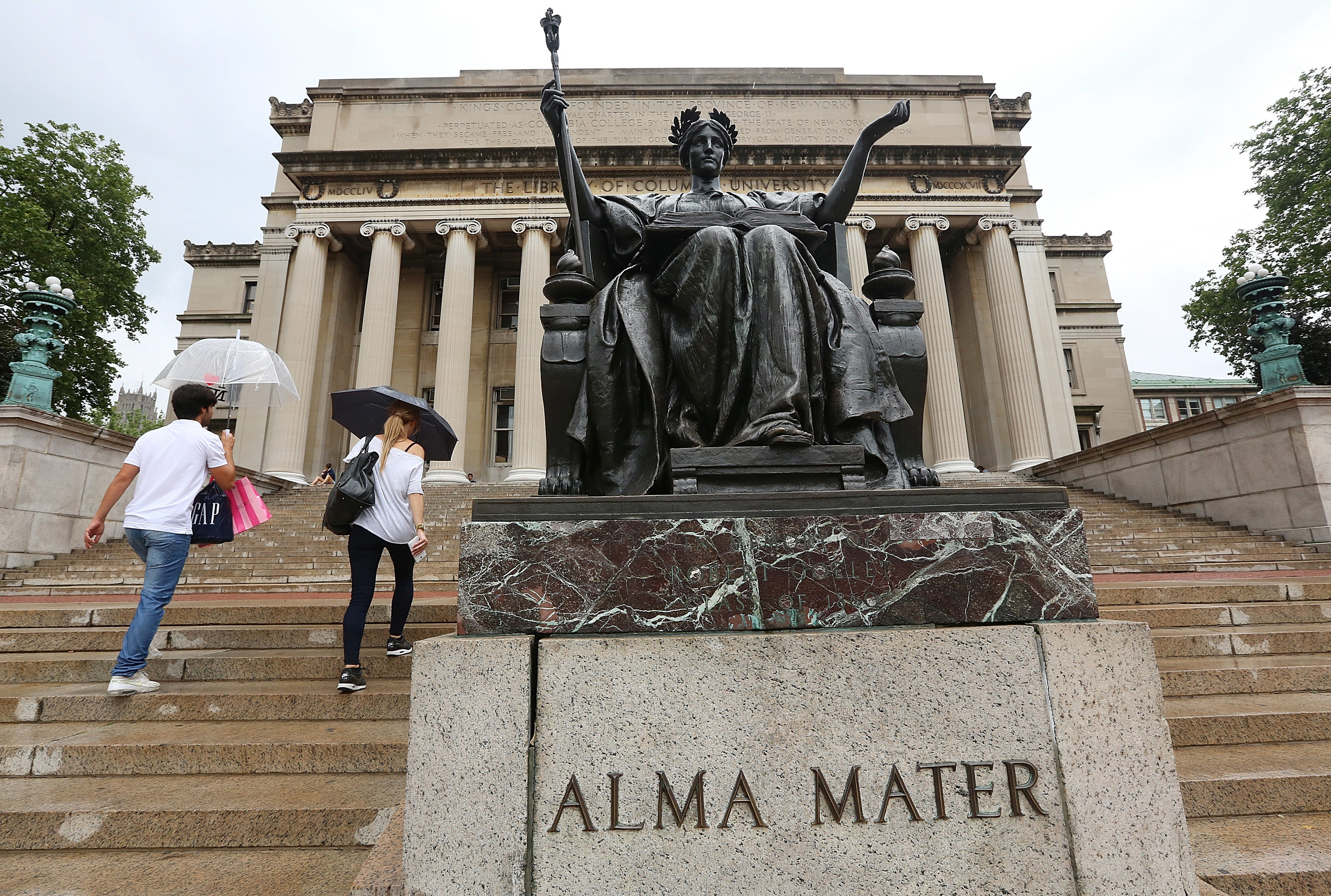I know kids that went to UVA despite being admitted to Duke, Cornell, MIT, Harvard. Not sure all the reasons but for some it was cost as they did not qualify for aide and received in state for UVA or full ride. Some of their co-workers went to the ivies or other high level elite .
Would they be anywhere different now had they gone to a more elite school? Would it make a difference on their resume for their next jobs or career advancement? Prob not because they are all high achievers and probably proved their worth and will continue to achieve.
The students were all happy with the decisions to go state college . OF the people I know that are 10+ out of college, two are teachers and another worked a short time before deciding to stay home with kids (william & mary/Harvard). One of the reasons that universities are able to be exploitative in the master's degree market is because they're not constrained in the same way that they are in the market for bachelor's degrees.
If you're offering bachelor's degrees, they all have to be four years long. You don't have a two-year bachelor's degree or a six-year bachelor's degree. You can obviously have a very fulfilling life no matter where you go to school. I went to a regional law school, where all the students are competing for a much smaller pool of potential jobs, so even though I gambled with less debt, my chances of getting a job were much lower. For people going into the "normal" prestigious careers, like law, finance, etc., I wonder if most would be better off just starting their own businesses.
I doubt many people graduate and feel completely fulfilled with their job as a corporate M/A lawyer… But maybe I just have a jaded view–law has certainly opened a lot of doors for me financially. My husband's older brother has a MBA from Harvard, but he was laid off, and started his own business for a while and failed. He managed to find a job again, but went through divorce, and now he is a financial advisor in his hometown.
His other brother skipped a MS degree in chemical engineering, and without a MS degree, he earned his PhD. This brother's wife won $XX0 million dollars in lottery, so he retired at age 55. No, because I am just as happy or happier than my husband's older brother who went to Harvard MBA. Should you win $X00 million? No, because they are the same people, and their lives haven't changed that much. I took her out for lunch, and I paid for her because I wanted to, and it made her happy since everyone expects her to pay for everything.
If your kid wants to go, and you have the money, sure. No, because you can study pretty much anything at any schools, and you will be OK. Why go to a place where all the arrogant people hang out?
I would want my kids to go to a college because it gives them an aura of confidence. I see my students killing themselves to get into a good college, but they really don't know why they want to go there. The elite class in our society created a few exclusive schools, so most people think that going to Harvard can help you open the door to an elite circle, and you will be happy forever. Admissions mania focuses most intensely on what might be called the Gotta-Get-Ins, the colleges with maximum allure. Some students and their parents have always been obsessed with getting into the best colleges, of course.
But as a result of rising population, rising affluence, and rising awareness of the value of education, millions of families are now in a state of nervous collapse regarding college admissions. Moreover, although the total number of college applicants keeps increasing, the number of freshman slots at the elite colleges has changed little. Thus competition for elite-college admission has grown ever more cutthroat. Each year more and more bright, qualified high school seniors don't receive the coveted thick envelope from a Gotta-Get-In. But maybe the kids who got into Yale were simply more talented or hardworking than those who got into Tulane.
To adjust for this, Krueger and Dale studied what happened to students who were accepted at an Ivy or a similar institution, but chose instead to attend a less sexy, "moderately selective" school. It turned out that such students had, on average, the same income twenty years later as graduates of the elite colleges. Explain in detail why this school is right for you. Identifying why you feel drawn to a specific school represents an important component of an undergraduate application, but it's even more significant at the grad school level. In addition to highlighting why the school as a whole speaks to your interests and desires for a campus community, Brewington says applicants should have specific reasons for wanting to attend a particular graduate school.
And if you're applying to multiple Ivy Leagues make sure you explain why each one is right for you. Highlight all of this in your application," she urges. Unfortunately, not every undergraduate institution reports their students' success rate. Moreover, even schools that report high percentages might not be telling the whole story. Over the years, we've observed a tendency among certain schools' pre-health advising committees to discourage students from applying to med school unless they have perfect or near-perfect stats.
By doing this, many undergrad institutions protect their medical school acceptance rates. It is the federal government that is lending the vast majority of loans used to pay for graduate school. Anyone who reads about how we have $1.7 trillion in outstanding student loan debt should always keep in mind that almost half of all new student loans in particular are for graduate school, not for undergraduate. You hear somebody that's got $200,000 or $300,000 in debt, they almost surely went to graduate school.
They didn't borrow that much money from the Department of Education to get a bachelor's degree. Felt that Yale was more focused on the undergraduates. Honestly, he was number 3 in his class, , had good, not great, scores , tons of leadership positions at school, won a lot of high school awards, 34 on all ACT sections, played clarinet well, etc. etc. He probably could have gone almost anywhere . He applied early decision which helped a lot too. The night he got accepted, I cried, and told him he had the golden ring, and his life would never be the same.
Has many amazing friends he is still close to (one started a magnet school!), and has had success beyond anything we could have imagined. He is a real saver, and probably could retire early, but he really likes his job as of now, so who knows. He is still single also, so if he marries, and starts spending a lot of money on houses, kids, etc. he may keep working. Thanks for the blog, I really enjoy reading it. He was always very bright, even in nursery school.
We chose to live in a good school district, made sure he was in a school that "tracked" kids who were bright, e.g. allowed them to take advanced track classes, that led to AP classes in high school. He had music lessons, and went to some really interesting summer programs. I was always investigating summer programs for "bright" kids.. So I guess you could say we spent a lot of money on his summer experiences.
We did the same for our 2 other children as well. In addition, it was funny, but all of the moms of the "high achievers" kind of stuck together and mentored each other about the ins and outs of high school and applying to college. I also helped him edit his college essays, and my husband schlepped him around to look at colleges from age 16 . Helps to see the prize at the end of the journey. Luckily we had the means to let him go wherever he wanted to, but he did not need much pushing; he was highly motivated.
Surely it is impossible to do away with the trials of the college-application process altogether. Harvard is marvelous, but you don't have to go there to get your foot in the door of life. "Today there are large numbers of colleges with good faculty, so faculty probably isn't the explanation for the advantage at the top," Hoxby says.
"Probably there is not much difference between the quality of the faculty at Princeton and at Rutgers. Hoxby notes that some medium-rated public universities have established internal "honors colleges" to attract top performers who might qualify for the best destinations. "Students at honors colleges in the public universities do okay, but not as well as they would do at the elite schools," Hoxby argues. The reason, she feels, is that they're not surrounded by other top-performing students. Ivy League schools offer a unique opportunity to learn from some of the brightest minds in the world in an academic setting, so students should try to take advantage of that at much as possible.
While all Ivy League students possess the drive, stamina, intelligence, and passion to secure a spot at the school, that doesn't mean everyone is cut throat. I was never an "A"student when I was in high school. I tell my students that I only went up to Geometry in high school, and I had to take it 3 times because I didn't get it. After high school, I went to Jr. college and managed to transfer to UCLA, and earned my BA, and MA from a local state university. I make almost $X00,000 a year, + 3 months summer off, and 2 weeks in winter, and 1 week in spring. My husband who went to a public engineering university in Canada makes about $X00,000 a year with 4 weeks paid vacation, but it is difficult for him to take a chuck of vacation time, but we squeeze in a few vacations a year.
So our combined income belongs to the top 5% of the highest earner bracket in the United States. We live in an affluent neighborhood of LA, and our neighbors are Stanford and Harvard graduates. We don't feel any better off or worse off compared to those people who went to Harvard. I feel that we make just as much money as they do. I have a teacher's pension, and have a great 403 portfolio. My husband's 401K has done well, so we can retire today if we want to.
But, I like teaching, so I will continue to work for awhile. I have been teaching at a public school in the LA area for the last 22 years. I love teaching, and I think it is the best profession in the world. I have seen so many tired students who do not sleep, and study until 4AM trying to get straight A's, and only to find out that they don't get accepted into the elite schools. Many public high school students don't have any clues about the legacy kids, how they already have their foot in the door at Harvard. Also the private elite high schools are well connected to those elite universities such as Harvard.
At our school, we have maybe 1 or 2 out of 1,700 students that get accepted into Harvard or Stanford. Most/all ivy league schools cover 100% of financial need of their students. I attend a peer institution and pay far less than I did when I went to community college . There's also the "Virtual Visiting Days" Discord server, which was founded by Class of 2019 Harvard alum Rainbow Yeung and aims to connect high school students with current college students and alumni. If you don't get in initially, it's important to have a back up plan. "What will you do if you don't get admitted on your first try?
How can you strengthen your application for round two? If you want to re-apply to one of these eight schools, you'll need to update your application to show how you've grown and/or accomplished impressive feats in the interim. While some may decide to emphasize points made on their applications, others use interviews as an opportunity to introduce other facets of themselves. Test scoresDepending on the particular discipline an individual plans to study or the department they hope to join, Ivy League grad programs require applicants to take at least one of several advanced study standardized tests. In addition to the most commonly required GRE, students may need to take the GMAT, LSAT, or MCAT if they plan to study business, law, or medicine, respectively.
Some schools do not specify score requirements, but applicants can review average scores from past admissions to get a sense of expectations. Depending on the competitiveness of the program, some schools may also want to review ACT or SAT scores that were taken for undergraduate education. TranscriptsIn order to verify whether an applicant earned the grades required for admissions consideration, Ivy League graduate programs require transcripts from all colleges or universities applicants attended. Some may also require high school transcripts if admission is highly competitive.
Each school maintains a unique process for reviewing transcripts. At Yale University, for instance, prospective degree seekers can upload unofficial transcripts during the application process but must provide official transcripts if they receive a letter of admittance. A lot of that just makes total sense and has nothing to do with anyone doing anything dastardly. It's just people who get master's degrees often or maybe even usually are working. It's a lot more convenient for them to study online.
I think one's degree of success in college is usually more important than the name of the college. I'm a surgeon, and I went to a small liberal arts college and graduated with a high GPA. A few high school buddies of mine went to Harvard and Harvard-equivalent colleges and graduated with significantly lower GPA's . When considering post-graduation outcomes for graduate schools, it also seems appropriate to assess the type of graduate program as their cash, opportunity costs, and career pathways will differ tremendously.
I think it's too soon to tell, but I did, and I consider myself to be at least on the path to success. Not really sure how you're defining success though. Having parents that are well off means you are part of a network of successful people, who can get you jobs that will put you on the path to also being successful. Contrary to popular belief, Ivy League graduate programs aren't looking for piano virtuoso linguists who dabble in ecology and Russian language but plan to study mathematics. While undergraduate schools tend to want well-rounded students, grad schools, particularly Ivy Leagues, are looking for students with much more focus. Rather than trying to spread yourself across multiple areas, Ivy League grad admissions panels much prefer individuals who excel in their chosen field and have shown dedication to advancing knowledge in that field.
If you happen to enjoy other interests, that's admirable, but may not be a selling point. When selecting individuals to write these letters of recommendation, applicants should think carefully and strategically. Most schools look for two to three letters from former professors, mentors, or supervisors. My own experiences were the stuff of nightmares and if I had to chose again I never would have gone to college because I was too poor and being intelligent gets you nowhere if you still make bad decisions. I had the debt from the first university paid off after working three jobs, seven days a week for just over a year. My life was so miserable and the area where I worked forced people onto welfare due to corruption.
What Makes Ivy League Schools Better If I had just worked those jobs a bit longer I could have moved to a much better area instead of wasting part of my life at another college that just wasn't worth it. Hindsight may be 20/20, but after a friend told me to "just go to business school" I had to counter "With what? Barely making a living and being a U.S. citizen now gets you rejected. I'm going to record the next call with the racist admissions officers and student employees at the University of Texas and send it to him.
To me an MBA isn't worth it at all because you're stuck in school, getting more debt, and not gaining the experience that people find to be more important. I graduated 2 years ago from a solidly ranked public engineering college. I landed a job as a project engineer in a medium sized municipal infrastructure consulting firm that has a nice mix of backgrounds at the firm. For a while I was feeling like a dumbass for taking this job because it was only paying 55k and It didn't feel like it would let me quickly become 'somebody'. But what I've realized is that the work life balance piece is just so ridiculously important.


























No comments:
Post a Comment
Note: Only a member of this blog may post a comment.